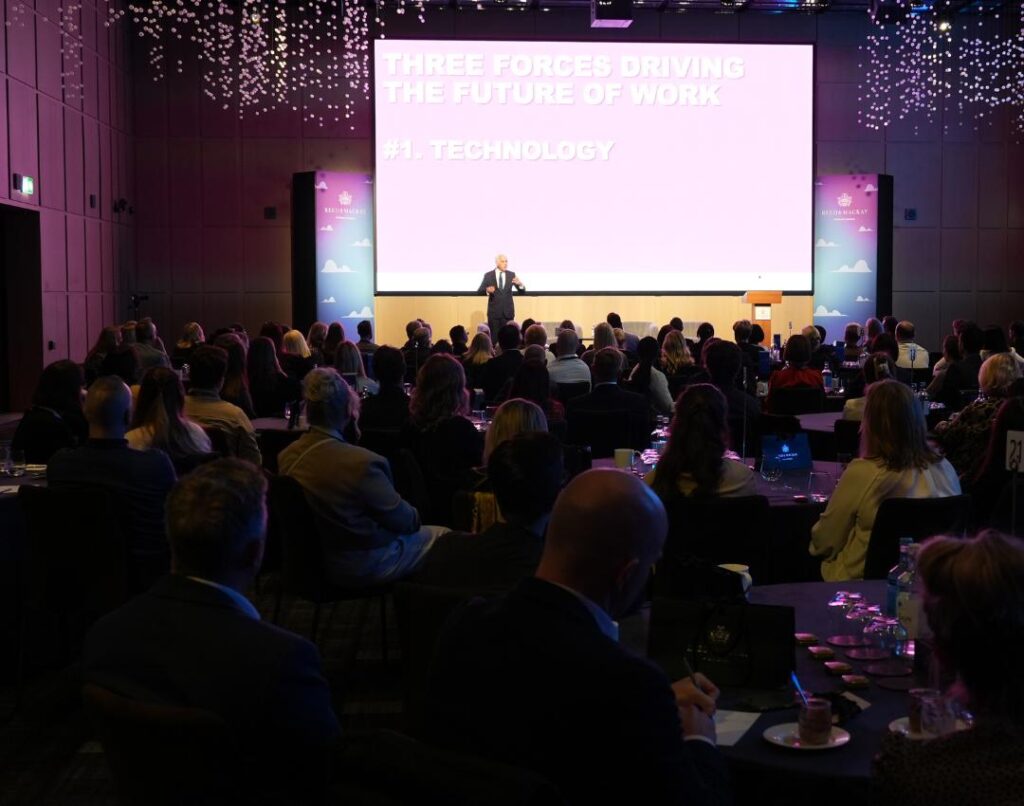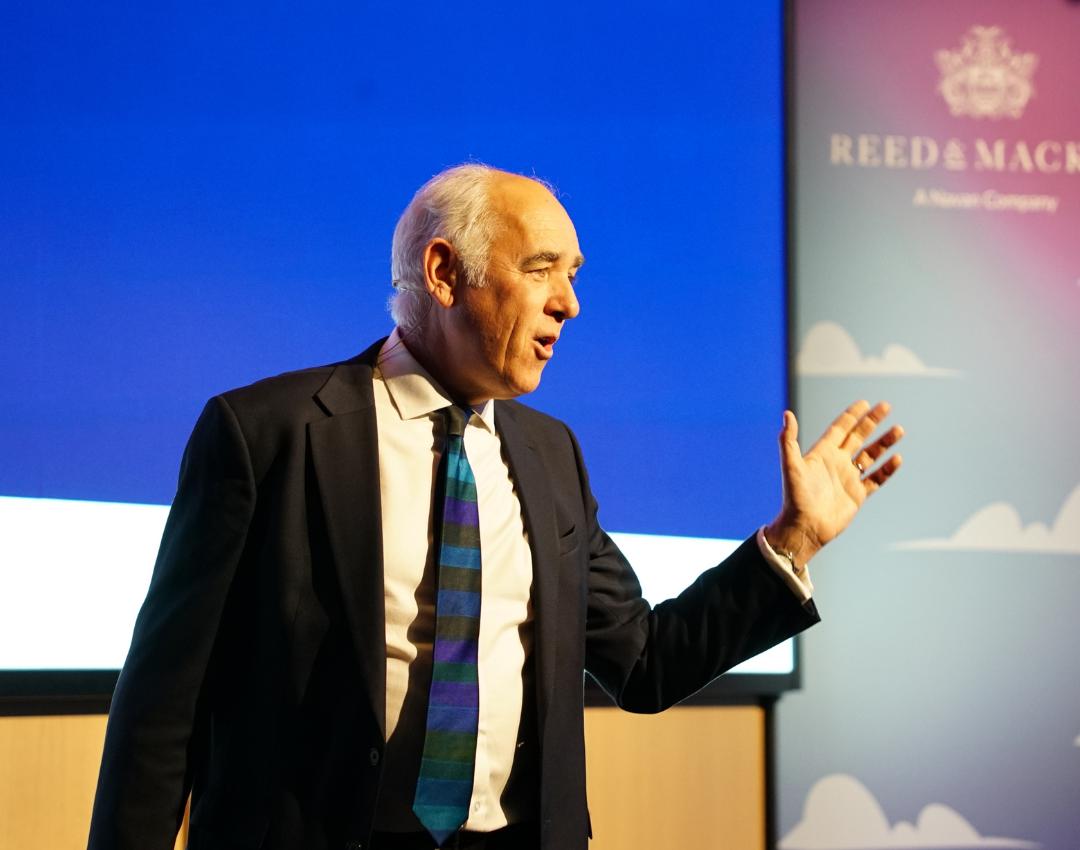What you’ll learn in this article:
- Expert insight into how different generations like to travel for business
- The implications of adapting travel programmes on recruitment and retention
- How the rise of ‘soft power’ is becoming essential in event management
Opening our recent annual flagship conference, the &Beyond Summit, Dr Paul Redmond – one of the UK’s leading experts on generational change and the future of work – emphasised the significant changes reshaping the workplace. Dr Redmond explored how these are being driven by technology and generational shifts. Here he goes into more depth, exploring how to adapt corporate travel for multi-generational workforce.
In today’s workforce, there are at least four generations working together: Baby Boomers, Generation X, Millennials and Generation Z. Each generation has its own unique way of interacting with the workplace.
Because each generation has grown up during different social, economic, political and technological times, each brings to its job its own set of rules, values, workstyles and preferences. Generations write differently, punctuate differently, dress differently, even manage people differently.
All of which makes generational research such a powerful advantage for business and corporate travel managers, HR professionals and event planners.
Because the question is no longer if business travel will evolve, but how to manage it in an age of rapid change and rising expectations.
The new multi-generational reality
Boomers (born 1942–1965) typically value loyalty, structured routines and face-to-face meetings – the cornerstone of traditional business travel. Generation X (1966–1980), the original ‘digital immigrants,’ often blend pragmatism with a preference for autonomy. Millennials (1981–1996) are tech-native and purpose-driven, seeking experiences over perks. Unlike Gen X, who are more likely to be motivated by material gains, Millennials are on the lookout for personal development opportunities. And given they are now the largest single working generation, having recently overtaken the Boomers, chances are, they’ll get it.
And Generation Z (1997–2010), coming soon to a workplace near you, are the most hyper-connected generation in history. For them, what matters is sustainability, connectivity and authenticity.
Gen Z now make up 6% of the workforce, a figure set to double within five years. Already, 82% of Gen Zs say sustainability influences their travel preferences, while 74% cite mental health and wellbeing as a top workplace priority. For companies running a managed travel programme, these are not trends. They are future norms.

Digital intelligence meets emotional intelligence
So how should organisations adapt their communication styles to each generation?
In this high-speed, AI-powered era, workplace success increasingly hinges on two forms of intelligence: Digital (DQ) and Emotional (EQ). Both are essential.
Digital intelligence includes fluency in AI, automation and data – essential for managing travel logistics, compliance and budgets at scale. Emotional intelligence, by contrast, is what enables firms to understand its clients – vital when designing travel and event experiences that resonate across generations.
So, for example, whereas a Gen X executive might appreciate an itinerary packed with back-to-back meetings and minimal downtime, a Millennial middle-manager might prefer fewer meetings, a focus on purpose-led partnerships and a chance to ‘live like a local’ at the destination. Meanwhile, Gen Zs may expect carbon tracking, DEI-conscious accommodation, and wellbeing apps uploaded to their phone.
Understanding generational preferences is now a business imperative. Managing business travel isn’t just about booking flights – it’s about curating experiences that align with diverse professional identities.
Sustainability: a new travel currency
Gen Z is rewriting the rules of engagement. According to recent surveys, 73% of Gen Zs say they would turn down a job if it didn’t align with their sustainability values. This is not idle talk, it’s a direct challenge to employers: Show me how you travel and I’ll show you who you are.
Expect more pressure for more eco-friendly transport options, carbon offsetting transparency, and hybrid event formats. Some firms are experimenting with ‘travel budgets’ linked to carbon emissions, rather than financial cost. Others are incentivising rail over air or integrating AI tools to suggest more sustainable travel choices.
The implications for recruitment and retention are real. In a recent national recruitment survey, one-third of employers reported using AI to streamline hiring – yet few are leveraging these tools to forecast or personalise travel planning by generation or values. Doing so could be a game changer.
Events and the rise of soft power
It’s easy to forget that travel isn’t just about logistics. It’s about creating moments that forge connections, trust and loyalty. In a world increasingly dominated by screens and Zoom or Teams calls, physical gatherings – whether offsites or global summits – have become critical cultural touchpoints.
Future-focused organisations are moving beyond one-size-fits-all event design. They’re building personalised, inclusive environments that make every generation feel seen and valued. This means rethinking everything from panel formats to accessibility, to wellbeing breaks and digital detox zones.
As the writer Alvin Toffler warned in his 1970s classic, Future Shock, the biggest threat isn’t change – it’s the speed of change outpacing our ability to adapt. In the context of events and travel, that means planning for psychological needs as well as professional objectives. Attention spans are shrinking. Mental fatigue is real. The best events now serve as recharging stations, not just networking hubs.

Looking ahead: will future generations travel differently?
Some suggest that digital tools will eventually eliminate the need for most business travel. But history says otherwise. We didn’t stop visiting family because phones were invented. We didn’t stop going to concerts because of Spotify.
Business travel will continue – but it will be different. It will be less about presence and more about purpose. AI will optimise logistics; human insight will shape the experience. And while avatars may attend some meetings on your behalf, they won’t replace the magic of a well-timed handshake or a shared meal.
The travel leaders of tomorrow will be those who understand that travel isn’t about just moving people from A to B – it’s about designing journeys that inspire, connect and evolve with each new generation.
In the AI age, that may be the most human skill of all.
Dr Paul Redmond is a speaker, writer, and researcher. He is one of the UK’s leading experts on generations and the future of work.
Get in touch
Mail [email protected] to discuss all of your corporate travel and event management needs.




